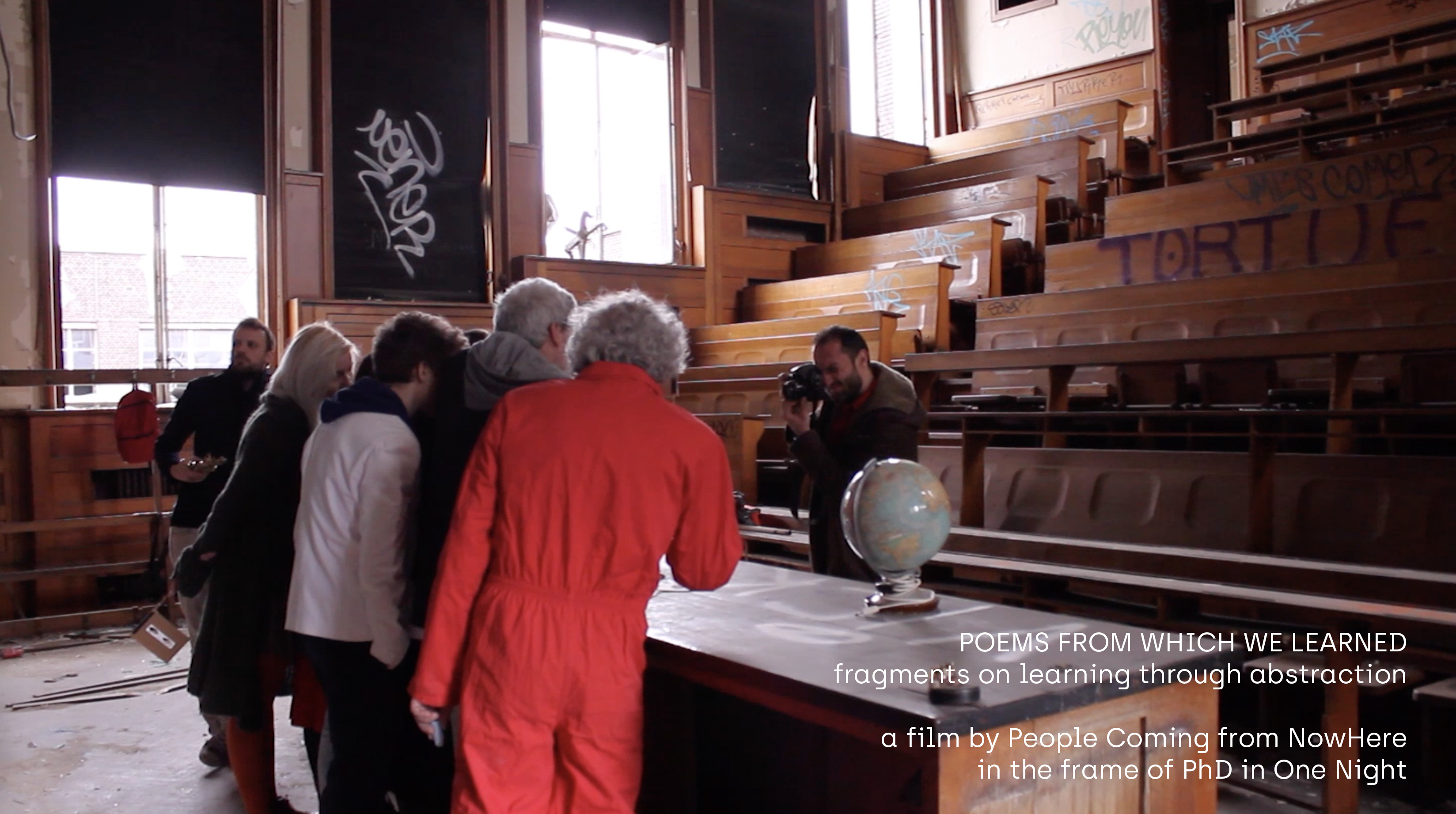-
:: mindception ::
[ texts ]Erik S. Roraback
Charles University and F.A.M.U. International, PragueWhat is our situation today? - on "Poems from which we Learned"

What is our situation today? Director Ivana Momčilović's Poems from Which We Learned confronts head-on and imaginatively interrogates the complex deadlocks of our contemporaneity. Inspired by the work of Jacques Rancière on the sensible, on the common sensorium, on “the equality of intelligence" (Joseph Jacotot), on the problems of how to learn of how to teach and of how to shatter the traditional function and hierarchy of the teacher-pupil relationship, Momčilović ́s picture offers new ways of thinking about these charged and fascinating spaces of thinking and questioning.
What is more, the film courageously mobilizes the following questions: How can the sensible alter the value ideals of our societies? How can we reimagine and critically rethink the relation between aesthetic space and ideology? How can we institute new forms of learning that take seriously self-learning, and a more polymathic approach to knowledge work? How does music relate to sensible forms of collectivity? What do we make of improvisation as an inspired method for engaging new forms of collectivity? How may the sensible of friendship be put in the service of new forms of life?
Crucially, what do we make of the children who ask at one point: "when will we have more Basch [Bach]?" How is it emancipatory to engage Bach for a common sensorium? The picture also takes seriously the notions of intelligence, of joy, of class struggle as a matter of the sensible, and last not least, of the need to think in the space of the impossible, which makes new things possible.**************************
Improvisation as a method means the unconscious takes over—
“you admit to people you are lost; you seek it out; it makes new things possible” --JR
This allows us to invent create fold for a new explosive mix of materials that will somehow be more primal more originary more cosmic more universal more real more agential more for the commons—
“The artwork gives questions, not answers”
Therefore what are the questions? Think again: what are the questions?
Even more: what are the questions?
Bach’s chaconne for violin {6:16} as a beautiful machine for thinking the commons for the Jacques Rancièrean “egalitarian sensorium” (2:15) yet to come into existence
“How can we connect research and teaching?” (cca 9: 40)
Ivana Momčilović / Ивана Момчиловић
In other words, how can we institute a culture that respects knowledge in all its forms and not only those subject to reification?
“ideology and space” “how can we connect it?” (cca 10:00+)
That is to say, how can we locate where the double side and nature of true subjectivity resides?
“finding this or that composer in another composer” (cca 13:00); that is, the problem of transindividuation as a key thing for the production of intergenerational community and continuativeness
“feeling the gaps the movement the moods of transformation” (cca 13:51)
This is where everything of importance takes place!
“producing and exchanging the knowledge, the sensible”
“class struggle of the sensible” (min. 15)
These ideas offer hope as against all those Althusserian or other Marxian orthodoxies out there that sometimes get in the way of new ways of thinking of struggle—
“It is about [these] kind of relations, about combining trust in everyone and trust in ourselves” (24: 13)
Ivana Momčilović / Ивана Момчиловић
Indeed trust is the big thing and like confidence given to others the most wonderful thing and gift of all!
“What is the relation between solitude and [the] collective?” (29:27) w/cellist playing Bach— This is a great mystery and a great challenge for the writings of Franz Kafka and so many others; it is as well for everyone interested in community relations and in the very nature of identity and subjectivity.
“Words are also actions and actions are a kind of words” (cca 30)
Ivana Momčilović / Ивана Момчиловић:
We therefore need to translate one into another : test our words with new actions and test our actions with new words.
“how could I translate thoughts into the movements and movements into the thoughts?”
Ivana Momčilović / Ивана Момчиловић
Is this not a key problem for thinking: to unearth and to discover more concretely so as to actualize for revolutions in thinking and in being?
“Why is musical education no longer part of obligatory curriculum in the schools?” (32:30)
--Ivana Momčilović / Ивана Момчиловић
Is this not a leading indicator of the barbarous times in which we live?
“Il me s’agit donc pas de conserver une mémoire mais de la créer” (cca min.36)
--Jacques Rancière
Is this not the point of identity making procedures. Identity is above all a future-oriented process and operation. Everything has yet to happen. And we cannot predict this at all not in the least.
“What would be the new class of struggle? What would it struggle for?” (cca min. 39)
--Ivana Momčilović / Ивана Момчиловић
Would struggle not revolve above all around transindividuation and so becoming in the other and the other becoming in us?
What of the sensible of friendship for film, for the director, for JR, for and with one another?
“We still do not know what a body can do” –Spinoza
Nor therefore do we yet know what a mind can think.**************************
Erik S. Roraback
Charles University and F.A.M.U. International, Prague
